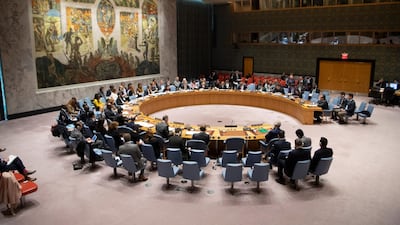Peace in the Middle East can only succeed within parameters agreed to by the international community, the French representative to the UN said, after the US gave formal recognition to Israel's ownership of the Golan Heights.
“It is true on every key issue and for the situation in the Golan in particular,” Francois Delattre told an emergency session of the UN Security Council.
The 15 members of the Security Council talked about the Golan Heights at an open meeting on Wednesday, after President Donald Trump's decision on Monday to recognise Israel's sovereignty over the strategic mountain range.
Mr Delattre said that 25 years after the Oslo Accords between the Palestine Liberation Organisation and Israel started a peace process, “there might be a temptation to turn one's back on the agreed framework".
But he said the temptation to pursue a unilateral path is fraught with danger.
Russia, Syria's closest ally, urged governments to continue considering the Golan Heights as illegally occupied territory.
“If anybody feels any temptation to follow this poor example, we would urge them to refrain from this aggressive revision of international law,” Russia's deputy ambassador Vladimir Safronkov said.
Speaker after speaker expressed support for Syria's sovereignty, leaving the US increasingly isolated on its Israel policy.
British ambassador Karen Pierce said the UK’s stance had not changed.
“It is our position that the Golan Heights is territory occupied by Israel,” Ms Pierce said.
“Annexation of territory by force is prohibited under international law, including the UN Charter.
“We emphasise the importance of adhering to a rules-based international system and abiding by UN resolutions, which are designed to protect that system.”
But Ms Pierce also stressed the UK's support of Israel's right to defend itself and urged Syrian President Bashar Al Assad, Hezbollah and Iran to “refrain from action that will only lead to increased instability in the region and put civilians at risk”.
South Africa, which has fraught relations with Israel that led to it downgrading its embassy in Tel Aviv, said the decision by the US “does nothing to assist in finding a long-term, peaceful solution to the conflict in the Middle East”.
The European members of the council – France, Britain, Germany, Belgium and Poland – also raised concerns about “broader consequences of recognising illegal annexation and also about the broader regional consequences.”
Riyad Mansour, the Palestinian ambassador to the UN, underscored the importance of “global consensus” in resolving the conflict.
Undersecretary General Rosemary DiCarlo expressed hope that “the recent developments will not be used as an excuse by anyone to pursue actions that could undermine the relative stability of the situation on Golan and beyond".
Mr Trump's proclamation raised questions about the future of the UN Disengagement Observer Force after its mandate expires on June 30.
US political co-ordinator Rodney Hunter told the council that the force had “a vital role to play in preserving stability between Israel and Syria”.
Israel captured the Golan Heights from Syria in the 1967 Arab-Israeli war and annexed the territory in 1981.
In December that year, a Security Council resolution called the annexation null and void, “without international legal effect”.

